The Crucial BX200 (480GB & 960GB) SSD Review: Crucial's First TLC NAND SSD
by Billy Tallis on November 3, 2015 9:00 AM ESTSequential Read Performance
Just like the random read test, sequential reads are tested across the span of a full drive and a representative sample of queue depths. This test performs 128kB reads. Most operations involving large files (typically images and videos) fall under this test's purveiw, but streaming or playing even the highest resolution videos doesn't require anywhere near the full bandwidth of a SSD. Copying files to another SSD or loading very large files into an editing program will more likely use all the speed that's available.
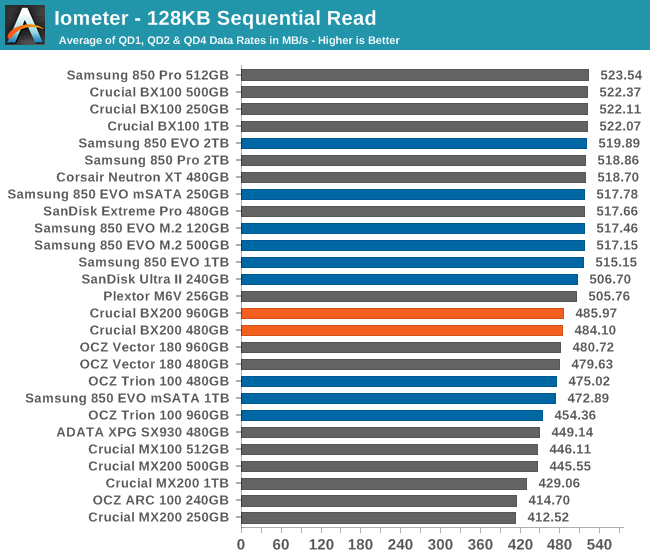
At last we see respectable performance from the BX200. Its sequential read speeds aren'te quite up to the SATA limit at low queue depths, but it can sustain solid performance. Unfortunately, for anyone holding out hope that the poor results we've seen so far may be a testbed issue, the otherwise respectable sequential performance puts that idea to rest.
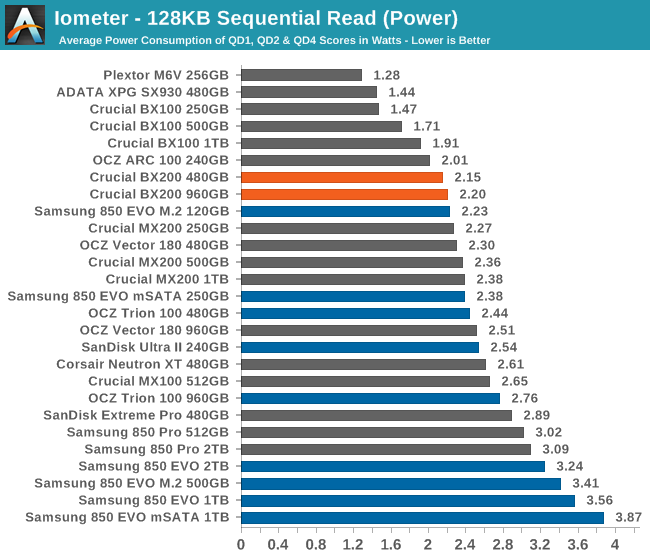
Power consumption on sequential reads is actually good, though it won't catch up with the best of drives.
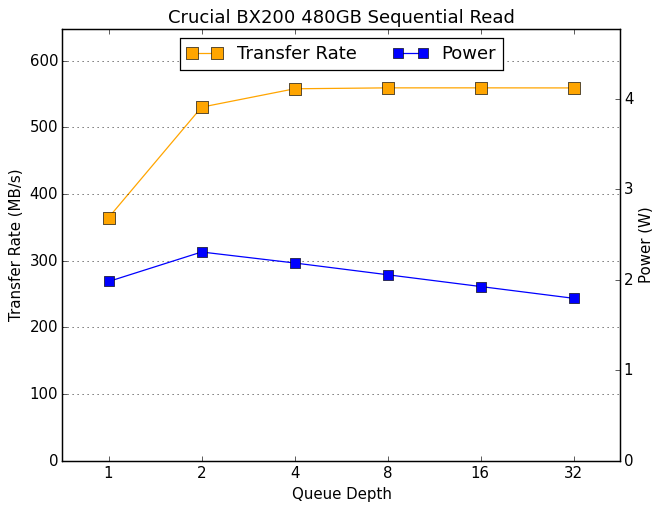 |
|||||||||
| Default | |||||||||
Given a larger queue depth, the BX200 is actually able to reach the performance plateau of the SATA speed limit; it just takes a little longer than the top tier of drives. Given the performance, it's not surprising to see that power consumption doesn't grow much. The shallow but steady decline in power consumption for the 480GB drive may be a sign that it's able to do some prefetching and caching to reduce the number of times it has to read from the flash.
Sequential Write Performance
The sequential write isn't limited to a small span of the disk, as that usually doesn't make a difference for this performance metric. As always, our averages are of the lower queue depths, but scaling to higher queue depths is also investigated. Bulk file copies and recording uncompressed video are the kind of uses that depend on sequential write performance.
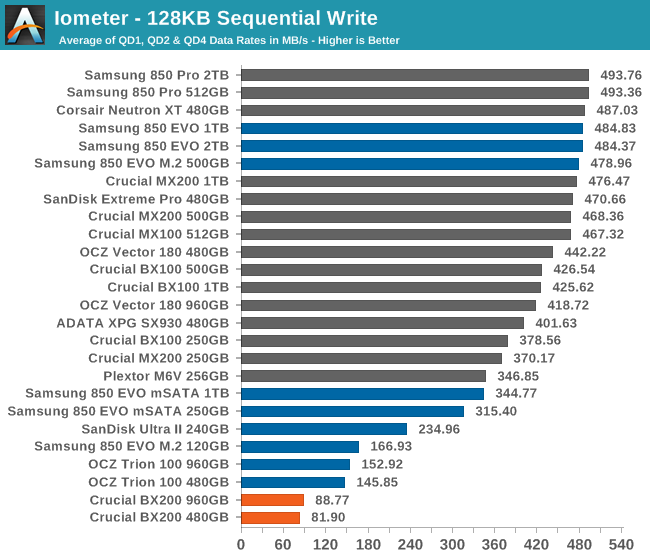
The initial good news we saw with the BX200's sequential read performance didn't last long. The drive's write performance is bad for sequential access just like random access, unfortunately displacing the Trion 100 as one of the worst drives in our current collection.
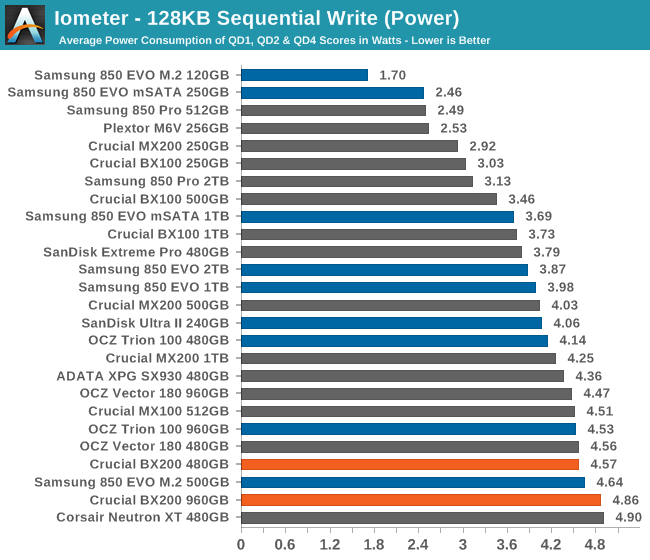
The BX200 power consumption during sequential writing is poor but not radically so. It would seem that Micron's TLC flash requires at most a little more power to write to than other TLC, and this drive is just wasting most of that power budget on background management.
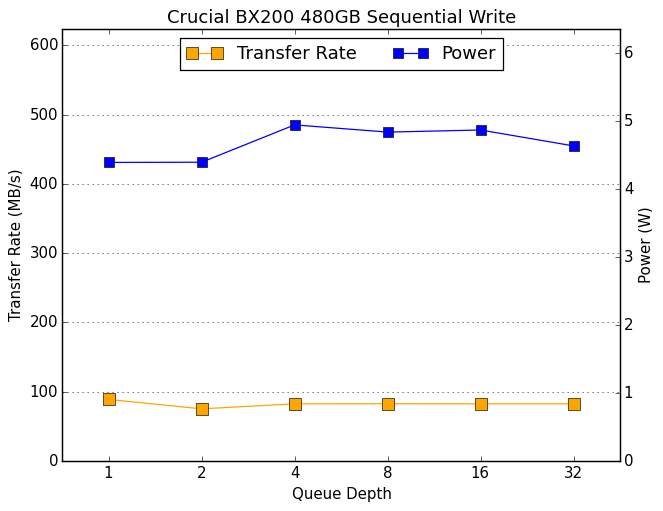 |
|||||||||
| Default | |||||||||
Looking at larger queue depths, performance drops slightly after QD1, and stays low as power consumption shifts around some but is always high. Neither capacity of the BX100 can sustain even 100MB/s of writes for a length of time.










85 Comments
View All Comments
Shadow7037932 - Tuesday, November 3, 2015 - link
That's kind of disappointing, esp. the 250GB version as it's only a little cheaper than the 850 EVO. However, the 960GB assuming sales/deals, go down to $230-250 in the coming months, I can see people buying it to replace HDDs for say storing games.eek2121 - Tuesday, November 3, 2015 - link
That's MSRP for the BX200. The street prices will probably be much cheaper.Samus - Tuesday, November 3, 2015 - link
For the price your still better off with the OCZ ARC100 with toshiba MLC and. Barefoot3 controller.LB-ID - Tuesday, November 3, 2015 - link
Toshiba's still selling things under the OCZ name? It long since needed to die and go away.Lazlo Panaflex - Friday, November 6, 2015 - link
+1 to that. Lots of people got burned by bad OCZ drives. Pretty dumb of Toshiba to keep calling them that.tamalero - Thursday, November 12, 2015 - link
Reminds me of Hitachi when they bough the IBM dextar drives.anyone remembers the horrible failures of the 10k and 15k rpm drives under IBM?
even their consumer disks were dying like mad.
They sold their business to Hitachi who fixed the mess.
did this happen to Toshiba and the OCZ drives?
leexgx - Tuesday, November 3, 2015 - link
the poor power use on that drive is very bad (why i got the BX100 as it has overall best lowest power usage under almost all loads) BX100 is not the fastest SSD drive around but BX200 for £10 more is not good, same with the MX200 as wellcoconutboy - Tuesday, November 3, 2015 - link
For several months now, on a near-weekly basis, Samsung Evo drives are hitting sale prices of ~$150 for 500GB and $75 for 250GB. Except for customers not paying attention, Crucial is gonna have a tough time moving these bx200 when there's unproven reliability, almost no price advantage, and a huge performance deficit.Crucial needs to drop their msrp or cut retailers a deal to lower street prices.
eek2121 - Tuesday, November 3, 2015 - link
You are comparing MSRP to street prices. Most of the SSDs in that list are running at least $20 (and sometimes much more) below MSRP. I'm betting $0.25-$0.27 per gig once these things see widespread availability. Don't be surprised if this drive causes price brackets to move again. 480/512 where the 256 was, 960/1tb where the 512 was, etc.The_Assimilator - Tuesday, November 3, 2015 - link
It bloody well *better* move price brackets, since it's apparently not good for much else.